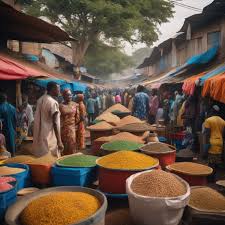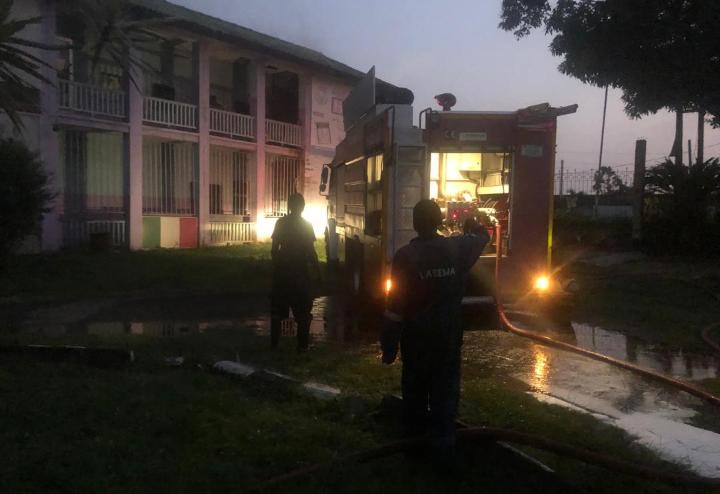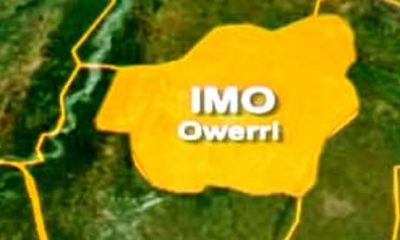Residents of Imo and Abia in the Southeast have blamed the persistently rising prices of foodstuffs in the country on the hike in the cost of transportation of goods.
The News Agency of Nigeria (NAN) reports that prices of various food stuffs, especially farm produce, have continued to skyrocket notwithstanding the season of harvest.
A cross-section of the people in Owerri said that the high cost of transportation was a direct impact of the fuel subsidy removal.
A cassava farmer, Mrs Chikaodi Igbokwe, said that although this is the period of harvest, farmers were paying through their nose to move their produce from the farm to the market.
Igbokwe said, “We pay heavily to transport produce from the farm to the market and this factor explains the reason for the hike in the prices of food items.”
An economist, Mr Henry Acho, said that the prices of basic food items were in “constant competition with the increasing prices of basic services”.
Acho said that since farmers and food vendors depend on the gains made from their goods to be able to pay for manufactured goods and social services, “it is unlikely to expect them to sell at give away prices.
“The inflation is general and not just about food items.
“What has not inflated? Education and healthcare services as well as landed property and social services – all are on the rise,” he said.
A senior staff member of the state Ministry of Agriculture, Mr Ken Chukwuemeka, said that the Imo Government was taking steps to cushion the impact of inflation on citizens.
According to Chukwuemeka, in recent time, farmers received inputs and palliatives distributed by the State Government.
Miss Harriet Ijeomah, the Executive Director of Harsco Media and Communication, a media consultancy firm with strong interests in agriculture, urged the Federal Government to empower farmers in the Southern part of the country.
Ijeomah said that empowering farmers would help them to produce more, encourage competition between the farmers in the south and their northern counterparts, who produce more.
She also advised government to release more grants for farmers to enable them to overcome challenges, such as climate change, currently impeding food production.
She said: “By providing more grants to farmers and educating them on climate change management, we will be doing ourselves a lot of good.
“Any nation that lacks food security is in for a bigger problem.”
In Abia, some agriculture stakeholders decried the hike in prices of food items and adduced various reasons for the challenge.
They cited high inflationary rates crippling productivity, hike in transport fares, and poor farm yields among other factors that made hike in food prices inevitable.
A member of the Governing Council, Federal University of Technology Owerri, Prof. Monica Ironkwe, said that the high cost of production directly affects food prices.
Ironkwe, who is the immediate past Abia Commissioner for Agriculture, said that naira devaluation, high cost of transportation and rural-urban migration have contributed to food price hike.
According to her, the significant drop in the number of people that are into farming made it difficult for the current food production level to meet the food needs of the nation’s increasing population.
She said that the first step to conquering the current situation remained a major shift from subsistence farming to commercialised agriculture.
“It is a cycle which must be broken before we can survive and become food sufficient and it is a cycle that requires everyone to start farming at a commercial level.
“A 1.5-liter bottle of palm oil is about N6,000 and a 25-liter jerry can, sold at N10,000 before, is now N60,000.
“Now, if you have palm trees at the back of your house, you can harvest the fruits and make palm oil yourself.
“The only solution is for people to rise and begin to take action by going into farming to address the situation.
“If everyone is producing, we will be able to increase the volume of food stuffs produced and bring down the price,” she said.
Ironkwe called on the National Universities Commission to include Practical Agriculture in its curriculum, thereby making it a mandatory course for undergraduates in the universities.
She described it as an innovative strategy for tackling the problem of food insecurity in Nigeria.
Also, a trader, Mr Bright Agomoh, said that the high cost of transportation caused by fuel price hike had been a constant causative factor in the increase in prices of food items.
Agomoh, who said he buys his commodities directly from famers in the north, also blamed insecurity as a serious challenge affecting crop production and prices.
“The issue of banditry in the north, where we buy some of these items from, is a recurrent problem that needs to be adequately addressed.
“Presently, a lot of farmers no longer go to farm because of fear of either being kidnapped or killed.
“Some of them that suffer the menace of bandits are compelled to pay before they are allowed to go to their farms to either plant or harvest their crops,” he said.
Agomoh further cited greed amonst some farmers and sellers as another factor responsible for the persistent hike in the cost of food items, the harvest season, notwithstanding.
He said that a bag of beans sells at N245,000, a bag of potato between N20,000 and N25,000, small bag of onions N110,000 and big bag N150,000.
Agomoh said that the hike put serious strain on the traders and buyers.
He said that it was unfortunate that some individuals were taking undue advantage of the prevailing economic circumstance to profiteer at the expense of the end users.
“The current situation has created a monopoly of the market for a few farmers, who have the courage to harvest and sell their produce at any price that suits them,” Agomoh said.
He urged the Federal Government to reduce the price of fuel, addjng that the cost of transportation and food items would definitely crash the moment the price of fuel is reviewed downwards.
Agomoh also urged the Federal Government to tackle terrorism and banditry head-on, so that farmers would return to their farms without the fear of attack.
“The crops are in the farm, the problem is how to go there and harvest them without being attacked.
“When there are enough goods in the market, there would be competition, and if there is competition, the prices would automatically go down,” he said.
For Mrs Ezinne Okoye, a rice farmer in Uzuakoli, Bende Local Government Area of Abia, said the soaring prices of agricultural produce can easily be attributed to the high cost of production and transportation.
According to Okoye, farmers are currently grappling with the challenges of high cost of inputs and other factors of production.
Okoye, who decried the high rate of inflation in the country, said “it is hurting local rice farmers and others.
“Except the government supports farmers generally by reducing the price of petrol or subsidise inputs for farmers, the situation would continue to get worse, especially this Christmas season.
“The crops harvesting period has little or no significant impact on the prices because the demand for food is higher than supply and demand determines price.
“As I said earlier, unless the government intervenes by supporting the farmers, this crisis will persist,” she said.
Mr Chidozie Kanu, a Climate Change Specialist for the Livelihood Improvement Family Enterprises-Niger Delta (LIFE-ND), Abia, blamed the increasing prices of food stuffs majorly on climate change and insecurity.
Kanu said that most farmers had yet to adjust to meeting with the modalities of engaging the variations of irregular rainfall patterns.
He said that LIFE-ND as a project is taking its beneficiaries through the means of combating or mitigating the climate change challenge.
He said that the project’s core priority is to boost production of rice, cassava, oil palm and poultry in the state by taking the farmers in the 100 communities of its operations through the best varieties.
“We engage the farmers in fast growing, early maturing, drought and disease-resistant crops, in order to address this challenge,” he said.
Kanu insisted that the government tackle the challenge of insecurity so that farmers have access to their farmlands.
“When the herder-farmer crisis is settled, it can guarantee food abundance, and when food is abundant, the prices will naturally reduce,” he said.
The Abia Commissioner for Agriculture, Dr Cliff Agbaeze, identified conflict and
insecurity, climate change, and economic shocks as key factors contributing to the nation’s food insecurity.
He said that Gov. Alex Otti had implemented targeted interventions to boost farmers’ productivity and sustainability in the state.
Agbaeze said that the interventions included capacity building, improved access to credit and financial inclusion, market information systems, linkage programmes, and climate resilient agricultural practices.
He said the governor had approved the disbursement of funds, ranging from N1 million to N3 million, to 298 of the 302 Abia farmers trained by CSS Farms on value chain techniques across various agribusiness endeavours.
The commissioner said that the initiative aligned with the governor’s vision to position Abia as a leader in agricultural production.
“A holistic appraisal on approaches towards achieving food and nutrition security would show clearly that collective action and context-specific solutions are imperative.
“Empowering smallholder farmers, addressing systemic vulnerabilities, and prioritising sustainable practices are veritable pathways to breaking the cycle of hunger and environmental degradation,” Agbaeze said.
Also, some food sellers at New Market (Ahia Ohuru) in Aba attributed the high cost of food items in the market to high cost of transportation.
They said that things became costly in the market since the removal of the fuel subsidy.
Mrs Princess Daniels, who deals in garri, rice, beans and also told NAN that prices of food items are costly because of transportation.
“For me, the increase in the prices of food stuffs is caused by the high cost of transportation because we do not have problem accessing the food items,” Daniels said.
A yam seller, Mr Hyginus Ekwuluo, said that the price of yam is determined by the cost of delivering it to the market.
“During President Goodluck Jonathan’s administration, we were buying a trailer-load of yam between N60,000 and N80,000 but it is between N1.6 million and N1.8 million now.
“A tuber of big yam now sells for N5,500? compared to three months ago, when it sold for N5000,” Ekwuluo said.
According to him, traders have no problem getting the yam “but the transportation keeps increasing everyday and that makes us to increase the price.
“We have to increase the price so that we can remain in business after paying the high cost of transportation,” Ekwuluo said.
Mr John Anyahuru attributed the high cost of food prices to inflation which, he said, is hindering productivity.
Anyahuru said that stealing of farm produce because of hunger and poverty has reduced the number of persons farming, hence the poor supply against high demand.
He said: “Some persons who live in the city and farm in the villages are now being discouraged from farming by some poor, hungry, and lazy people, who steal their farm produce.
“This has reduced the rate at which people, who love to farm, although they live in the city, come to farm in the villages,” Anyahuru said.






























